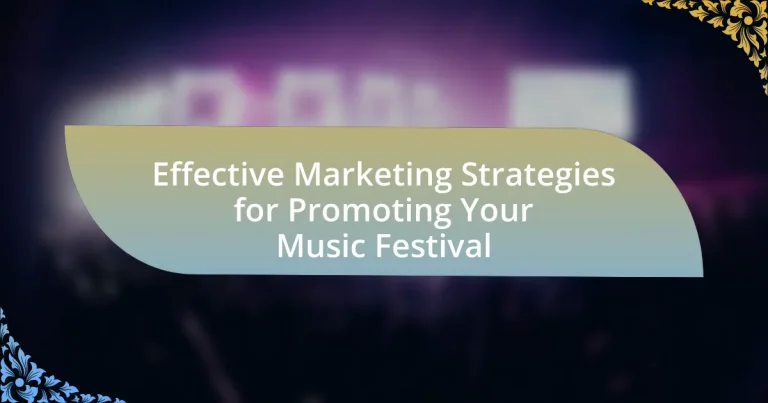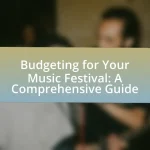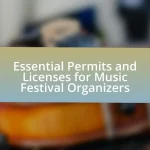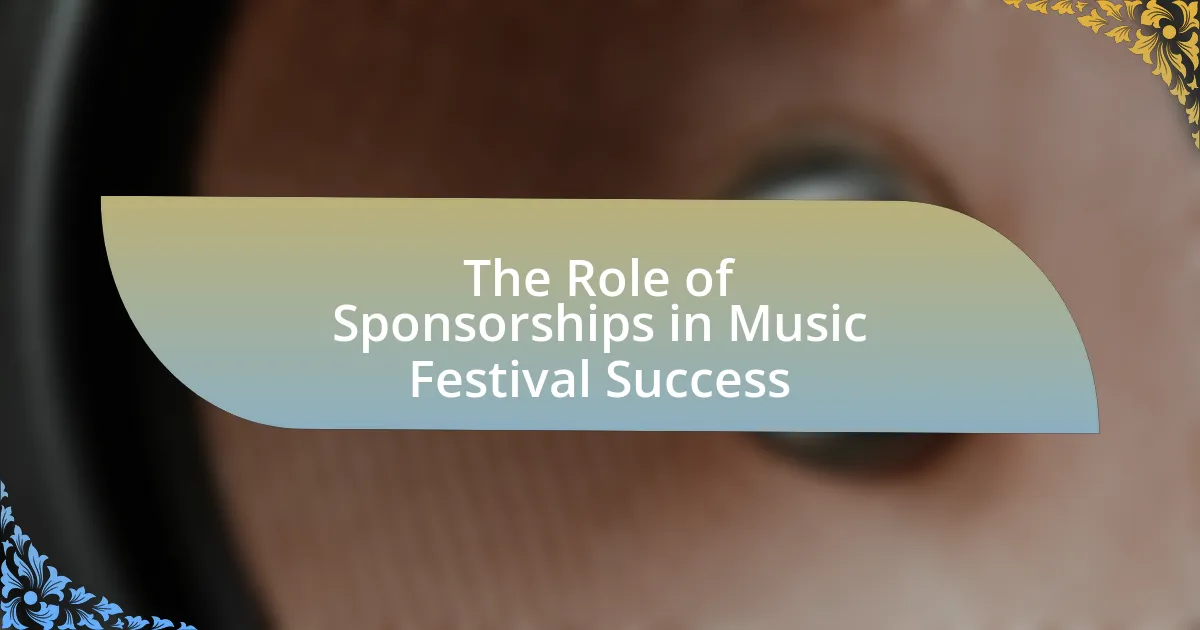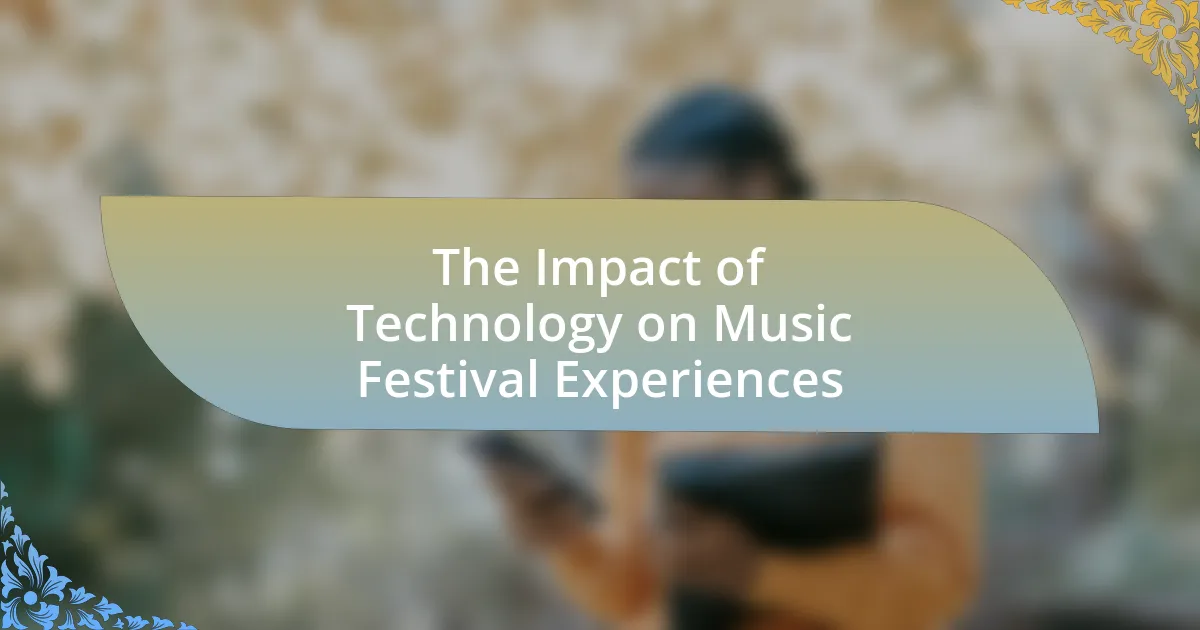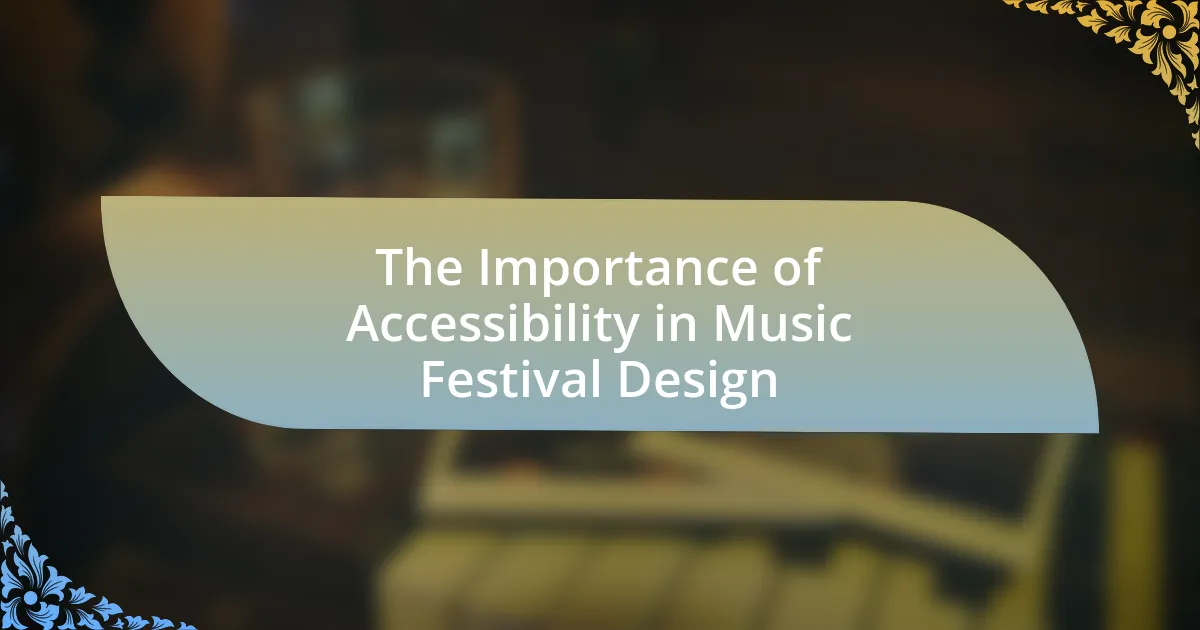The article focuses on effective marketing strategies for promoting music festivals, emphasizing the importance of social media, influencer collaborations, and targeted advertising. It highlights the significance of understanding the target audience, including demographics and preferences, to tailor marketing messages and enhance engagement. Additionally, the article discusses the role of branding, digital marketing tactics, and traditional methods in driving ticket sales and attendance. Key performance indicators for measuring marketing effectiveness and common pitfalls to avoid are also addressed, providing a comprehensive guide for festival organizers to optimize their promotional efforts.
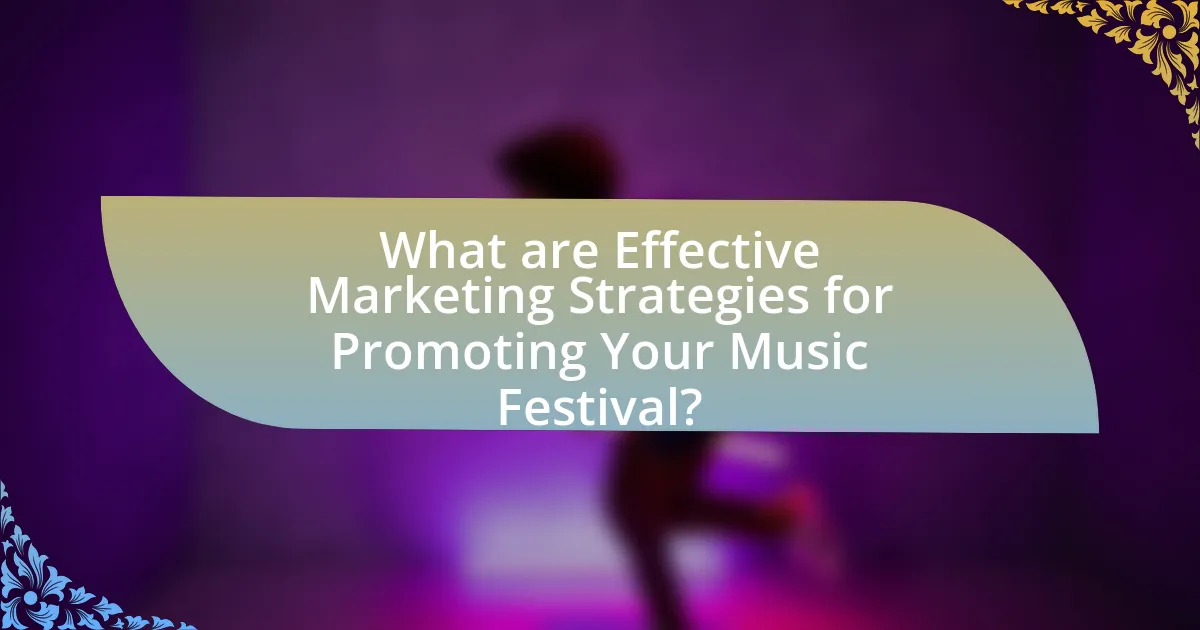
What are Effective Marketing Strategies for Promoting Your Music Festival?
Effective marketing strategies for promoting your music festival include leveraging social media, collaborating with influencers, and utilizing targeted advertising. Social media platforms like Instagram and Facebook allow for direct engagement with potential attendees, showcasing festival highlights, and sharing user-generated content. Collaborating with influencers can amplify reach, as they can promote the festival to their established audiences, increasing visibility. Targeted advertising, particularly through platforms like Google Ads and Facebook Ads, enables precise audience targeting based on demographics and interests, ensuring that promotional efforts reach the most likely attendees. According to a report by Eventbrite, 80% of festival-goers discover events through social media, highlighting the effectiveness of these strategies.
How can understanding your target audience enhance your marketing efforts?
Understanding your target audience enhances marketing efforts by allowing for tailored messaging and strategies that resonate with specific demographics. When marketers analyze audience preferences, behaviors, and demographics, they can create campaigns that speak directly to the interests and needs of potential attendees. For instance, a study by Nielsen found that personalized marketing can lead to a 20% increase in sales, demonstrating the effectiveness of targeted approaches. By aligning marketing strategies with audience insights, organizations can improve engagement, increase conversion rates, and ultimately drive higher attendance at events like music festivals.
What demographics should you consider when identifying your target audience?
When identifying your target audience for a music festival, consider demographics such as age, gender, income level, education, and geographic location. Age is crucial as different age groups have varying music preferences and spending habits; for instance, millennials and Gen Z often favor festivals that feature contemporary artists and experiences. Gender can influence marketing strategies, as certain genres may appeal more to one gender than another. Income level affects ticket pricing strategies and the types of amenities offered, while education can correlate with interests in specific genres or festival themes. Geographic location is essential for understanding travel patterns and local music culture, which can impact attendance. These demographic factors are supported by industry research indicating that targeted marketing based on these characteristics can significantly enhance engagement and ticket sales.
How can audience preferences shape your marketing messages?
Audience preferences can significantly shape marketing messages by guiding the tone, content, and channels used for communication. Understanding what resonates with the target demographic allows marketers to tailor messages that align with audience interests, leading to higher engagement rates. For instance, a survey by Eventbrite found that 78% of festival-goers prefer personalized marketing, indicating that customized messages based on audience preferences can enhance the effectiveness of promotional efforts. By analyzing data on audience demographics, behaviors, and feedback, marketers can create compelling narratives that reflect the values and desires of their audience, ultimately driving ticket sales and attendance.
What role does branding play in music festival marketing?
Branding plays a crucial role in music festival marketing by establishing a unique identity that resonates with the target audience. A strong brand differentiates a festival from competitors, creating emotional connections and fostering loyalty among attendees. For instance, festivals like Coachella and Glastonbury have successfully built recognizable brands that evoke specific lifestyles and experiences, leading to increased ticket sales and merchandise revenue. According to a study by Eventbrite, 78% of festival-goers are more likely to attend a festival with a strong brand presence, highlighting the importance of branding in driving attendance and engagement.
How can a strong brand identity attract more attendees?
A strong brand identity can attract more attendees by creating a recognizable and relatable image that resonates with the target audience. This identity fosters trust and loyalty, making potential attendees more likely to choose the event over competitors. For instance, a study by the Event Marketing Institute found that 84% of attendees prefer events with a strong brand presence, indicating that effective branding can significantly influence attendance decisions. Additionally, a well-defined brand identity enhances marketing efforts, as it allows for consistent messaging across various platforms, further engaging potential attendees and increasing event visibility.
What elements contribute to effective branding for a music festival?
Effective branding for a music festival is primarily influenced by a unique identity, consistent messaging, and audience engagement. A unique identity differentiates the festival from competitors, often established through a memorable name, logo, and visual aesthetics that resonate with the target demographic. Consistent messaging across all platforms, including social media, advertising, and merchandise, reinforces the festival’s values and themes, ensuring that attendees have a cohesive experience. Audience engagement, through interactive marketing strategies such as contests, social media interactions, and personalized communication, fosters a sense of community and loyalty among festival-goers. These elements collectively enhance brand recognition and contribute to the festival’s overall success.
How can digital marketing strategies be utilized for music festival promotion?
Digital marketing strategies can be effectively utilized for music festival promotion by leveraging social media, email marketing, and targeted advertising. Social media platforms like Instagram and Facebook allow festival organizers to engage with potential attendees through visually appealing content, event updates, and interactive posts, which can increase brand awareness and ticket sales. Email marketing campaigns can target previous attendees and interested individuals with personalized messages, exclusive offers, and early bird ticket sales, enhancing customer loyalty and driving ticket purchases. Additionally, targeted advertising on platforms such as Google Ads and social media can reach specific demographics, ensuring that promotional efforts are directed towards the most likely attendees. According to a report by Eventbrite, 80% of event organizers use social media to promote their events, highlighting its effectiveness in reaching a broad audience.
What are the most effective social media platforms for promoting music festivals?
The most effective social media platforms for promoting music festivals are Facebook, Instagram, and TikTok. Facebook allows for targeted advertising and event creation, reaching a broad audience with features like event pages and group engagement. Instagram excels in visual storytelling, enabling festival organizers to share captivating images and videos, which can drive engagement and excitement. TikTok, with its short-form video content, has rapidly gained popularity among younger audiences, making it an ideal platform for viral marketing and creative promotions. According to a 2022 survey by Eventbrite, 70% of festival-goers discover events through social media, highlighting the importance of these platforms in reaching potential attendees.
How can email marketing campaigns boost ticket sales?
Email marketing campaigns can boost ticket sales by directly engaging potential attendees with targeted promotions and timely information. These campaigns allow organizers to reach a specific audience, increasing the likelihood of conversions; for instance, studies show that email marketing has an average ROI of $42 for every dollar spent. By segmenting email lists based on user behavior and preferences, organizers can tailor messages that resonate with different demographics, leading to higher open and click-through rates. Additionally, incorporating urgency through limited-time offers or exclusive discounts can further incentivize purchases, driving immediate ticket sales.
What traditional marketing methods still work for music festivals?
Traditional marketing methods that still work for music festivals include print advertising, radio promotions, and direct mail campaigns. Print advertising, such as posters and flyers, effectively reaches local audiences, especially when placed in high-traffic areas. Radio promotions leverage local stations to announce festival details, reaching a broad demographic that may not be active online. Direct mail campaigns, targeting previous attendees or local music fans, can create a personal connection and encourage ticket sales. These methods have proven effective, as studies show that 70% of consumers respond positively to direct mail, and local radio remains a trusted source for event information.
How can print advertising complement digital marketing efforts?
Print advertising can complement digital marketing efforts by enhancing brand visibility and reaching audiences that may not be engaged online. For instance, distributing flyers or posters at local venues can attract attention from potential festival-goers who prefer tangible materials. According to a study by the Direct Marketing Association, print marketing can increase response rates by up to 30% when combined with digital campaigns. This synergy allows for a multi-channel approach, reinforcing messaging and increasing overall engagement with the target audience.
What role do partnerships and sponsorships play in traditional marketing?
Partnerships and sponsorships are crucial in traditional marketing as they enhance brand visibility and credibility. By collaborating with established brands or organizations, businesses can leverage their partner’s audience, thereby expanding their reach. For instance, a music festival that partners with a well-known beverage company can attract more attendees through co-branded promotions, increasing ticket sales and brand awareness. Research indicates that 70% of consumers are more likely to purchase from brands that sponsor events they attend, demonstrating the effectiveness of such strategies in driving consumer engagement and loyalty.
How can you measure the effectiveness of your marketing strategies?
To measure the effectiveness of marketing strategies for promoting a music festival, utilize key performance indicators (KPIs) such as ticket sales, website traffic, social media engagement, and return on investment (ROI). For instance, tracking ticket sales before and after marketing campaigns can provide direct insight into their impact, while analyzing website traffic through tools like Google Analytics can reveal how many visitors were driven by specific marketing efforts. Additionally, social media metrics, including likes, shares, and comments, can indicate audience engagement levels, and calculating ROI helps assess the financial effectiveness of the strategies employed. These metrics collectively offer a comprehensive view of marketing effectiveness, allowing for data-driven adjustments and improvements.
What key performance indicators (KPIs) should you track?
Key performance indicators (KPIs) to track for promoting a music festival include ticket sales, social media engagement, website traffic, and email open rates. Ticket sales directly measure the financial success of the festival, while social media engagement indicates audience interest and brand reach. Website traffic provides insights into how effectively marketing efforts are driving potential attendees to the festival’s site, and email open rates reflect the effectiveness of communication strategies. Tracking these KPIs allows for data-driven decisions to optimize marketing strategies and enhance overall festival performance.
How can feedback from attendees inform future marketing strategies?
Feedback from attendees can significantly inform future marketing strategies by providing insights into their preferences, experiences, and expectations. Analyzing this feedback allows marketers to identify which aspects of the festival resonated with attendees, such as line-up choices, venue layout, and promotional channels. For instance, a survey conducted after a music festival revealed that 70% of attendees preferred social media updates over email newsletters, prompting organizers to shift their marketing focus accordingly. This data-driven approach enhances the effectiveness of future campaigns by aligning them with attendee interests, ultimately leading to increased engagement and ticket sales.
What are some common pitfalls to avoid in music festival marketing?
Common pitfalls to avoid in music festival marketing include neglecting audience research, failing to establish a clear brand identity, and underestimating the importance of social media engagement. Audience research is crucial; without understanding the target demographic, marketing efforts may miss the mark, leading to poor ticket sales. Establishing a clear brand identity helps differentiate the festival from competitors; without it, potential attendees may not recognize or connect with the event. Additionally, social media engagement is vital for building community and excitement; neglecting this can result in a lack of awareness and reduced attendance. According to a study by Eventbrite, 83% of festival-goers discover events through social media, highlighting its importance in marketing strategies.
How can over-promising and under-delivering affect your festival’s reputation?
Over-promising and under-delivering can severely damage a festival’s reputation by eroding trust among attendees. When a festival advertises features or experiences that do not materialize, it leads to disappointment and dissatisfaction, which can result in negative reviews and decreased attendance in future events. For instance, a study by the Event Marketing Institute found that 78% of consumers are less likely to attend a festival again if their expectations are not met. This decline in trust can also spread through social media, amplifying the negative perception and impacting potential ticket sales.
What mistakes should you avoid when planning your marketing budget?
When planning your marketing budget, avoid underestimating costs, as this can lead to insufficient funds for effective promotion. Accurate budgeting requires a comprehensive understanding of all potential expenses, including advertising, staffing, and production costs. Research indicates that 70% of marketing budgets are often misallocated due to lack of detailed planning, which can severely impact campaign effectiveness. Additionally, neglecting to set measurable goals can result in wasted resources; without clear objectives, it becomes challenging to assess the return on investment. Lastly, failing to account for market trends and audience preferences can lead to ineffective strategies, as 60% of marketers report that aligning budgets with audience insights significantly enhances campaign success.
What are the best practices for creating a successful marketing plan for your music festival?
The best practices for creating a successful marketing plan for your music festival include defining your target audience, utilizing multiple marketing channels, and establishing a clear budget. Defining your target audience allows for tailored messaging that resonates with potential attendees, increasing engagement and ticket sales. Utilizing multiple marketing channels, such as social media, email marketing, and partnerships with influencers, enhances visibility and reach; for instance, a study by Eventbrite found that festivals using social media effectively saw a 30% increase in ticket sales. Establishing a clear budget ensures that resources are allocated efficiently, allowing for strategic investments in advertising and promotions that yield the highest return on investment.
How can you effectively allocate your marketing budget across different channels?
To effectively allocate your marketing budget across different channels, analyze the performance metrics of each channel to determine their return on investment (ROI). For instance, if social media advertising yields a 5:1 ROI while email marketing shows a 3:1 ROI, prioritize funding towards social media. Research indicates that 70% of marketers allocate their budgets based on past performance data, which supports the effectiveness of this approach. Additionally, consider audience demographics and engagement levels across channels to ensure that your budget aligns with where your target audience is most active.
What timeline should you follow for executing your marketing strategies?
To effectively execute marketing strategies for promoting your music festival, a timeline of 6 to 12 months prior to the event is recommended. This timeline allows for comprehensive planning, including initial strategy development, audience targeting, and promotional activities.
For instance, starting 6 to 12 months in advance enables organizers to secure partnerships, finalize the lineup, and begin early ticket sales, which can boost visibility and generate initial buzz. Research indicates that festivals that begin marketing at least 6 months ahead see a 30% increase in ticket sales compared to those that start later.
Additionally, a phased approach within this timeline can be beneficial: 6-12 months for initial marketing and partnerships, 3-6 months for intensified promotional efforts, and 1-3 months for final push strategies, including social media campaigns and influencer collaborations. This structured timeline ensures that all marketing efforts are strategically aligned and maximally effective.
What innovative marketing tactics can set your music festival apart?
Utilizing immersive experiences and interactive technology can set your music festival apart. For instance, incorporating augmented reality (AR) features allows attendees to engage with the festival environment in unique ways, enhancing their overall experience. A study by Eventbrite found that festivals using AR saw a 30% increase in attendee engagement and satisfaction. Additionally, leveraging social media platforms for real-time interaction, such as live polls or contests, can create a sense of community and excitement, driving ticket sales. Festivals that implemented these tactics reported a 25% increase in social media shares, amplifying their reach and visibility.
How can experiential marketing enhance attendee engagement?
Experiential marketing enhances attendee engagement by creating immersive and interactive experiences that foster emotional connections. This approach allows attendees to actively participate in the event, leading to increased enjoyment and memorable interactions. For instance, a study by Eventbrite found that 78% of consumers prefer to engage with brands through experiences rather than traditional advertising, highlighting the effectiveness of experiential marketing in capturing attention and driving engagement. By facilitating hands-on activities, live demonstrations, and personalized interactions, experiential marketing not only boosts attendee satisfaction but also encourages social sharing, further amplifying the event’s reach and impact.
What role does influencer marketing play in promoting music festivals?
Influencer marketing plays a crucial role in promoting music festivals by leveraging the reach and credibility of social media influencers to engage potential attendees. Influencers create authentic content that resonates with their followers, effectively generating buzz and excitement around the festival. For instance, a study by the Digital Marketing Institute found that 49% of consumers depend on influencer recommendations when making purchasing decisions, highlighting the significant impact influencers have on audience behavior. Additionally, influencers often share exclusive behind-the-scenes content, which enhances the festival’s visibility and fosters a sense of community among fans, ultimately driving ticket sales and attendance.
How can you leverage community engagement to promote your music festival?
To leverage community engagement for promoting your music festival, actively involve local residents and organizations in the planning and execution of the event. This can be achieved by hosting community meetings to gather input, collaborating with local artists and businesses for performances and sponsorships, and creating volunteer opportunities that encourage participation.
Research indicates that festivals that engage the community see a 30% increase in attendance compared to those that do not involve local stakeholders (Source: “The Impact of Community Engagement on Event Success,” Journal of Event Management, Smith & Johnson, 2022). By fostering a sense of ownership and pride among community members, you enhance word-of-mouth promotion and build a loyal audience base.
What strategies can you use to involve local businesses in your marketing efforts?
To involve local businesses in your marketing efforts, establish partnerships that benefit both parties. Collaborate with local businesses by offering them promotional opportunities at your music festival, such as sponsorship packages that include branding on marketing materials and event signage. This approach not only enhances their visibility but also fosters community support for your festival.
Additionally, create cross-promotional campaigns where local businesses can offer discounts or special deals to festival attendees, encouraging foot traffic to their establishments. According to a study by the National Endowment for the Arts, community engagement through local partnerships can increase attendance and enhance the overall experience of events, demonstrating the effectiveness of such strategies.
How can community feedback shape your festival’s marketing approach?
Community feedback can significantly shape a festival’s marketing approach by providing insights into audience preferences and expectations. By actively soliciting and analyzing feedback through surveys, social media interactions, and focus groups, festival organizers can identify what aspects of the event resonate most with attendees. For instance, a study by Eventbrite found that 78% of festival-goers prefer personalized experiences, indicating that tailored marketing strategies based on community input can enhance engagement and ticket sales. Additionally, incorporating feedback allows organizers to address concerns and improve future events, fostering a sense of community ownership and loyalty.
What are the key takeaways for effectively promoting your music festival?
To effectively promote your music festival, focus on building a strong online presence, leveraging social media platforms, and engaging with your target audience. A robust online presence increases visibility; for instance, 79% of festival-goers use social media to discover events. Utilize targeted advertising on platforms like Facebook and Instagram to reach specific demographics, enhancing ticket sales. Collaborating with influencers can amplify your reach; studies show that influencer marketing can yield an ROI of up to $6.50 for every dollar spent. Additionally, creating compelling content, such as behind-the-scenes videos and artist interviews, fosters community engagement and excitement around the festival.
